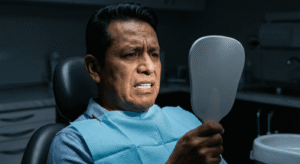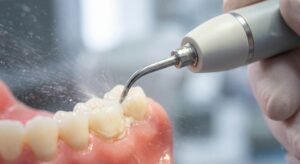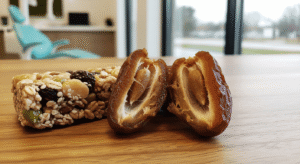1. Your gums bleed and you think it’s normal. It’s not.
You ignore it. You brush your teeth, spit, and see blood. Again. “Must be the toothbrush,” you think. “Nothing serious.” Wrong.
Bleeding gums are not normal. It’s an alarm, a red flag, a clear warning that something is seriously wrong in your mouth. And if you ignore it, you’re giving a silent enemy time to destroy what you should be protecting the most: your gums and the bone that holds your teeth in place.
That enemy is called pyorrhea. It may sound old-fashioned, even harmless. But it’s the opposite. It’s the advanced stage of periodontal disease that can take out healthy teeth and leave you with a gap that not even the best implant can fully replace.
2. Pyorrhea doesn’t start with pain — it starts with neglect

The most dangerous thing about pyorrhea is that it doesn’t hurt… until it’s too late.
There’s no warning “click.” No sharp pain that sends you running to the dentist. Just small symptoms that build up: swollen gums, persistent bad breath, a tooth that seems to move slightly.
And that’s when it starts to act—quietly. Because pyorrhea feeds on neglect.
Many patients think that as long as the tooth doesn’t hurt, everything’s fine. And when they show up at the office with mobility, bone loss, or “loose” teeth, they’re shocked. But by then, it’s already an uphill battle.
“Pyorrhea is constant inflammation in the gums. This 100% affects the stability of the tooth. Healthy gums and bone keep the tooth stable. If there’s constant inflammation, bone is lost, and that can lead to ongoing, aggressive periodontal disease that ends in tooth loss—healthy or not.” — Dr. Alejandra Mora
3. What’s really happening in your mouth when you have pyorrhea?

Let’s get to the point. Pyorrhea isn’t just “inflammation.” It’s a chronic and progressive infection that first attacks the gum, then the bone that holds the tooth in place.
Here’s a step-by-step breakdown:
- It starts as gingivitis: bleeding gums, redness, sensitivity.
- If left untreated, the infection spreads to the periodontal ligament.
- Then it reaches the alveolar bone, gradually destroying it.
- The tooth loses support, becomes loose, and eventually falls out.
The brutal part is that the tooth can be completely healthy—no cavities, no fractures, perfect… but without gum or bone to support it, it has no future.
Pyorrhea steals the foundation, not the structure. And that’s what makes it so sneaky.
4. The link between inflamed gums and teeth falling out (even if they’re healthy)
This is where many patients don’t understand what’s happening. They tell me:
— “Doctor, my tooth fell out but it didn’t have a cavity.”
And I tell them: “It didn’t need a cavity — it needed a gum.”
Pyorrhea destroys the support around your teeth, not the tooth itself. And that’s much harder to get back.
A healthy gum is like a solid foundation. A healthy periodontium (gum + ligament + bone) is what keeps your teeth in place. But when that foundation is compromised by constant inflammation, bacteria, and built-up plaque… the house collapses even if the walls are intact.
“Healthy gums and bone keep the tooth stable. If there is constant inflammation, you start to lose bone, and it ends with the loss of the tooth, healthy or not.” — Dr. Alejandra Mora
5. Lo que nadie te dice sobre la piorrea: se puede prevenir… pero no se cura sola
No hay una pastilla mágica, ni un enjuague milagroso, ni una receta casera que te cure la piorrea. No desaparece con el tiempo. Solo empeora.
But here's the good news: it can be completely prevented.
Yes, completely.
Pyorrhea is a consequence of accumulated neglect. If you maintain rigorous hygiene, have regular dental check-ups, and get deep cleanings when necessary, it's almost impossible for you to reach that stage.
What you can't do is ignore it and then expect it to "heal on its own." Once bone is lost, the body doesn't regenerate it by itself. You need professional intervention: surgical cleanings, deep scalings, grafts in some cases, and above all… consistency.
6. Habits That Fuel Pyorrhea Without You Even Noticing
Want to know what things you do in your daily life that are silently fueling that inflammation?
Here are the most common culprits:
- Smoking: prevents tissue from regenerating properly.
- Poor brushing: or brushing too aggressively.
- Not using floss: plaque builds up between your teeth without you seeing it.
- Skipping professional cleanings: tartar can only be removed at the dentist's office.
- Diets high in sugar and low in nutrients: yes, your diet also affects your gum health.
- Chronic stress: which weakens your immune system and accelerates inflammatory processes.
Cada uno de estos factores crea el caldo de cultivo perfecto para que la piorrea se instale y haga lo suyo. Y lo peor: no avisa.
7. ¿Se puede revertir el daño? Esto es lo que sí (y lo que no) puedes hacer
Here comes the realistic part. Once pyorrhea has been diagnosed, treatment is not optional, and it's not a quick fix either.
Here's what you can do:
- Root planing and scaling: a deep cleaning below the gum line.
- Local or systemic antibiotics, depending on the case.
- Periodontal surgeries if there are deep pockets.
- Control harmful habits: quit smoking, improve hygiene, change your diet.
What you cannot do:
- Wait it out hoping it will "calm down."
- Think that "if it doesn't hurt, it's not serious."
- Use mouthwash as the only solution.
- Change your toothbrush and think you've done your part.
Pyorrhea requires active intervention. And yes, it can be controlled. But if you let time pass, the damage will be irreversible..
8. Straightforward Conclusion: If You Lose Your Gums, You Lose Your Teeth
There's no gentle way to say it: if you lose the health of your gums, you lose your natural smile. It's that simple.
And it all starts by ignoring a bleeding gum, bad breath that won't go away, or a strange feeling of pressure between your teeth. That's when you need to take action.
“Healthy gums and bone keep the tooth stable. But if there is constant inflammation, you start to lose it, and it leads to a constant and aggressive periodontal disease.” — words:
Don't wait until your teeth "feel loose" to realize something is wrong. Do it now. Your smile depends on your gums more than you think.
So now what?
Make an appointment. Get a cleaning. Ask for a periodontal evaluation. Don't settle for just brushing. Because brushing is good, but it's not enough if pyorrhea is already knocking at your door.
And if you've already lost teeth, don't beat yourself up. But don't lose any more. Take action today.
Share this article with anyone who still thinks bleeding gums are "normal."
Because what's normal isn't always healthy. And what's silent… isn't always harmless.





